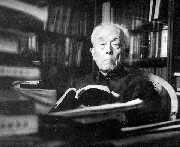 Whenever Ji Xianlin walks on the campus, such a thing often occurs: a bicycle stops suddenly in front of him and off jumps a student, who asks, "Are you Professor Ji Xianlin?" Following Ji's nod, the student usually says, "Mr. Ji, I just want to say 'I really admire you!'" Then, the student will bow to Ji Xianlin before turning around to ride away on his or her bicycle.
Whenever Ji Xianlin walks on the campus, such a thing often occurs: a bicycle stops suddenly in front of him and off jumps a student, who asks, "Are you Professor Ji Xianlin?" Following Ji's nod, the student usually says, "Mr. Ji, I just want to say 'I really admire you!'" Then, the student will bow to Ji Xianlin before turning around to ride away on his or her bicycle.
There are times when young people driving a car may get out the car just to bow to him, which is a sign of their admiration of him. It is the charm of Ji's personality that has won him enormous esteem.
A philosopher once said, "Greatness lies in commonness." Ji Xianlin personifies this truism. He is a common human being, and his greatness lies in one character, "真"(truthfulness), which makes up his unique personality charm.
Ji Xianlin has always treated all kinds of people with sincerity. He is a caring person who loves his families, relatives, friends, teachers, and students dearly. He still remembers those illiterate farmers who played with him during his childhood and especially respects anybody who, like him, are kind and honest.
 Ji Xianlin is also well known for telling the truth. As early as in 1986, he wrote an article titled "A Few Words for Hu Shi (a famous but very controversial scholar)" which shocked the literary circles. At that time, Hu Shi was seen as a "negative example," and no one dared to touch this "forbidden area."
Ji Xianlin is also well known for telling the truth. As early as in 1986, he wrote an article titled "A Few Words for Hu Shi (a famous but very controversial scholar)" which shocked the literary circles. At that time, Hu Shi was seen as a "negative example," and no one dared to touch this "forbidden area."
Though some of his friends tries to persuade him from doing such a risky thing, Ji Xianlin, thinking the evaluation of Hu Shi was not only a problem of personal appraisal, but also a big event of significant academic implications, felt it necessary to tell the truth about Hu Shi. In other words, Ji's view is that even if Hu Shi did make unforgivable mistakes, his contributions in modern Chinese literature should not be ignored. His article won the affirmation and support of a great many scholars, breaking a path for the re-evaluation of the nearly century-old development of modern Chinese literature.
